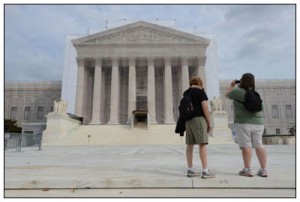High court hears ex post facto sentencing case
By: KIMBERLY ATKINS, BridgeTower Media Newswires//February 27, 2013//
High court hears ex post facto sentencing case
By: KIMBERLY ATKINS, BridgeTower Media Newswires//February 27, 2013//
 At oral arguments Tuesday, the justices of the U.S. Supreme Court questioned whether a sentence imposed according to the U.S. Sentencing Guidelines in place at the time of sentencing, which was harsher than the sentence that would have been imposed under guidelines at the time of the crime, violated the Constitution’s Ex Post Facto Clause.
At oral arguments Tuesday, the justices of the U.S. Supreme Court questioned whether a sentence imposed according to the U.S. Sentencing Guidelines in place at the time of sentencing, which was harsher than the sentence that would have been imposed under guidelines at the time of the crime, violated the Constitution’s Ex Post Facto Clause.
The case, Peugh v. U.S., involves the conviction of Marvin Peugh on five counts of bank fraud. He objected to his resulting 70-month sentence, imposed pursuant to federal sentencing guidelines in place at the time of sentencing, arguing that it was 20 months longer than a sentence under the guidelines in place at the time of the crime would have been, and therefore violated the ex post facto clause.
The 7th U.S. Circuit Court of Appeals disagreed, finding that the advisory nature of the newer guidelines vitiates any ex post facto problem. The U.S. Supreme Court granted certiorari.
At oral arguments, Stephen B. Kinnaird, a partner in the Washington office of Paul Hastings, argued on the defendant’s behalf that “retroactive application of harsher guidelines passed after the offense violates the Ex Post Facto Clause.”
Justice Antonin G. Scalia pointed out that the newer guidelines are advisory.
“It’s not a change of the law if the law does not require the guidelines to be imposed,” Scalia said.
Kinnaird said the constitutional clause is violated where “there’s a sufficient risk of increasing the penalty,” as there is under the longer guidelines.
Eric J. Feigin, assistant to the Solicitor General, argued on the government’s behalf that, for an ex post facto violation to occur, the law in question must affect “the legal consequences of a prior act.”
“A guidelines amendment doesn’t do that,” Feigin said.
He said that the change in the guidelines was designed to give judges more flexibility. But Scalia asked whether it could be retroactivity in disguise.
“The Sentencing Commission can make a revision of the guidelines retroactive [but] only do that for revisions that lower the suggested penalty,” Scalia said, “because if it could increase it, then it would be violating, according to your [opponent], the Ex Post Facto Clause.”
A decision is expected later this term.
Legal News
- Waukesha man sentenced to 30 years for Sex Trafficking
- 12-year-old shot in Milwaukee Wednesday with ‘serious injuries’
- Milwaukee man convicted of laundering proceeds of business email compromise fraud schemes
- Giuliani, Meadows among 18 indicted in Arizona fake electors case
- Some State Bar diversity participants walk away from program
- Wisconsin court issues arrest warrant ‘in error’ for Minocqua Brewing owner
- Iranian nationals charged cyber campaign targeting U.S. Companies
- Facing mostly white juries, are Milwaukee County defendants of color truly judged by their peers?
- Milwaukee Mayor speaks in D.C. Tuesday at White House water summit
- Chicago man sentenced to prison after being caught with ‘Trump Gun’
- FTC bans non-competes
- Gov. Evers seeks applicants for Dane County Circuit Court
WLJ People
- Power 30 Personal Injury Attorneys – Russell Nicolet
- Power 30 Personal Injury Attorneys – Benjamin Nicolet
- Power 30 Personal Injury Attorneys – Dustin T. Woehl
- Power 30 Personal Injury Attorneys – Katherine Metzger
- Power 30 Personal Injury Attorneys – Joseph Ryan
- Power 30 Personal Injury Attorneys – James M. Ryan
- Power 30 Personal Injury Attorneys – Dana Wachs
- Power 30 Personal Injury Attorneys – Mark L. Thomsen
- Power 30 Personal Injury Attorneys – Matthew Lein
- Power 30 Personal Injury Attorneys – Jeffrey A. Pitman
- Power 30 Personal Injury Attorneys – William Pemberton
- Power 30 Personal Injury Attorneys – Howard S. Sicula











